TNPSC Group 2 Syllabus: The Tamil Nadu Public Service Commission is responsible for recruiting eligible candidates for Civil Services posts under various government departments of Tamil Nadu State. For this purpose, the TNPSC Group 2 2025 notification has been released with 645 vacancies for Group 2 & 2A posts on its official website.
All interested candidates who are applying for the Combined Civil Service Examination II (Group 2) must understand the TNPSC Group 2 Syllabus and Exam Pattern to crack this exam. For the convenience of candidates, we have provided a detailed Group 2 Exam Syllabus, which includes Prelims & Mains Exam in the article.
TNPSC Group 2 Syllabus And Exam Pattern 2025
To crack the Group 2 Prelims and Mains Exam, the first responsibility is to go through the official Group 2 & 2A exam syllabus and exam pattern details. Through analysing the syllabus, candidates could be familiar with important topics that are generally asked in the preliminary and mains examinations.
This article gives a clear summary of the changes, new topics, exam pattern updates, and expected difficulty level. To get more details about the TNPSC Group 2 Syllabus and Exam pattern details, candidates must refer to the given article.
TNPSC Group 2 Syllabus 2025: Preliminary Examination
The Syllabus of TNPSC Group 2 Prelims Examination has been divided into 3 stages, such as General Studies, Mental Ability and Aptitude and General English or General Tamil. In General Studies, it includes major topics such as General Science, Geography of India, History & Culture of India, Indian Polity, Indian Economy and more. For the ease of the candidates, we have also provided topic-wise TNPSC Group 2 Syllabus details in the table given below
| TNPSC Group 2 Syllabus 2025: Prelims Exam | |
| Unit | Category |
| Unit I: General Science (5 Questions) | Scientific knowledge and scientific temper; Power of reasoning; Rote learning vs conceptual learning; Science as a tool to understand the past, present, and future; Nature of universe; General scientific laws; Mechanics; Properties of matter, force, motion, and energy; Everyday application of mechanics, electricity, magnetism, light, sound, heat, nuclear physics, laser, electronics, and communications; Elements and compounds, acids, bases, salts, petroleum products, fertilizers, pesticides; Main concepts of life science; Classification of living organisms; Evolution; Genetics; Physiology; Nutrition; Health and hygiene; Human diseases; Environment and ecology; Latest inventions in science and technology; Current affairs. |
| Unit II: Geography of India (5 Questions) | Location; Physical features; Monsoon, rainfall, weather and climate; Water resources; Rivers in India; Soil; Minerals and natural resources; Forest and wildlife; Agricultural pattern; Transport; Communication; Social geography; Population density and distribution; Racial and linguistic groups; Major tribes; Natural calamity; Disaster management; Environmental pollution; Reasons and preventive measures; Climate change; Green energy; Geographical landmarks; Current affairs. |
| Unit III: History, Culture of India, and Indian National Movement (10 Questions) | Indus Valley Civilization; Guptas; Delhi Sultans; Mughals; Marathas; Age of Vijayanagaram and Bahmani Kingdoms; South Indian history; National Renaissance; Early uprisings against British rule; Indian National Congress; Emergence of leaders – B.R. Ambedkar, Bhagat Singh, Bharathiar, V.O. Chidambaranar, Jawaharlal Nehru, Kamaraj, Mahatma Gandhi, Maulana Abul Kalam Azad, Thanthai Periyar, Rajaji, Subash Chandra Bose, Rabindranath Tagore; Different modes of agitation; Satyagraha and militant movements; Communalism and Partition; Change and continuity in socio-cultural history; Characteristics of Indian culture; Unity in diversity – Race, language, custom; India as a secular state; Social harmony; Prominent personalities in arts, science, literature, philosophy. |
| Unit IV: Indian Polity (15 Questions) | Constitution of India; Preamble; Salient features; Union, State and Union Territory; Citizenship; Fundamental Rights; Fundamental Duties; Directive Principles of State Policy; Union Executive; Union Legislature; State Executive; State Legislature; Local governments; Panchayat Raj; Spirit of federalism; Centre–State relationships; Election; Judiciary; Rule of law; Corruption in public life; Anti-corruption measures; Lokpal and Lok Ayukta; Right to Information; Empowerment of women; Consumer Protection Forums; Human Rights Charter; Political parties and political system; Current affairs. |
| Unit V: Indian Economy and Development Administration in Tamil Nadu (20 Questions) | Nature of Indian economy; Five-year plan models; NITI Aayog; Sources of revenue; Reserve Bank of India; Fiscal policy; Finance Commission; Resource sharing; Goods and Services Tax; Structure of Indian economy; Employment generation; Land reforms; Agriculture; Industrial growth; Rural welfare-oriented programmes; Social problems; Education; Health; Geography of Tamil Nadu; Achievements of Tamil Nadu; e-Governance; Public awareness; Welfare-oriented government schemes and their utility; Problems in public delivery systems; Current socio-economic issues; Current affairs. |
| Unit VI: History, Culture, Heritage, and Socio-Political Movements in Tamil Nadu (20 Questions) | History of Tamil society; Archaeological discoveries; Tamil literature from Sangam age to contemporary times; Thirukkural – significance as a secular literature; Relevance to everyday life; Impact on humanity; Universal values; Socio-political and economic relevance; Philosophical content; Role of Tamil Nadu in freedom struggle; Early agitations against British rule; Role of women in freedom struggle; Evolution of 19th and 20th century socio-political movements – Justice Party, Rationalism, Self-Respect Movement, Dravidian Movement; Contributions of Thanthai Periyar and Peraringar Anna. |
| Part B- Mental Ability and Aptitude | |
| Unit I: Aptitude (15 Questions) | Simplification – Percentage – Highest Common Factor (HCF) – Lowest Common Multiple (LCM) – Ratio and Proportion – Simple interest – Compound interest – Area – Volume – Time and Work. |
| Unit II: Reasoning (10 Questions) |
Logical reasoning – Puzzles – Dice – Visual reasoning – Alpha numeric reasoning – Number series. |
| Part-C Language (English) | |
| Unit I: Grammar (25 Questions) | Parts of speech, tenses, voice, types of sentences, articles, prepositions, conjunctions, sentence correction, synthesis, direct and indirect speech, punctuation, and degrees of comparison. |
| Unit II: Vocabulary (15 Questions) | Synonyms, antonyms, homophones, collective nouns, idioms, phrases, phrasal verbs, one-word substitutions, and foreign words. |
| Unit III: Writing Skills (10 Questions) | Rearrangement of letters, sentence jumbles, passage completion, and paragraph formation. |
| Unit IV: Technical Terms (10 Questions) | Official correspondence, technical terms, and government terminology. |
| Unit V: Reading Comprehension (20 Questions) | Passage-based questions, multiple-choice comprehension, and factual inference. |
| Unit VI: Literary Works (15 Questions) | Important English literature authors, notable books, literary devices, figures of speech, and poetry analysis. |
| General Tamil (Syllabus) | |
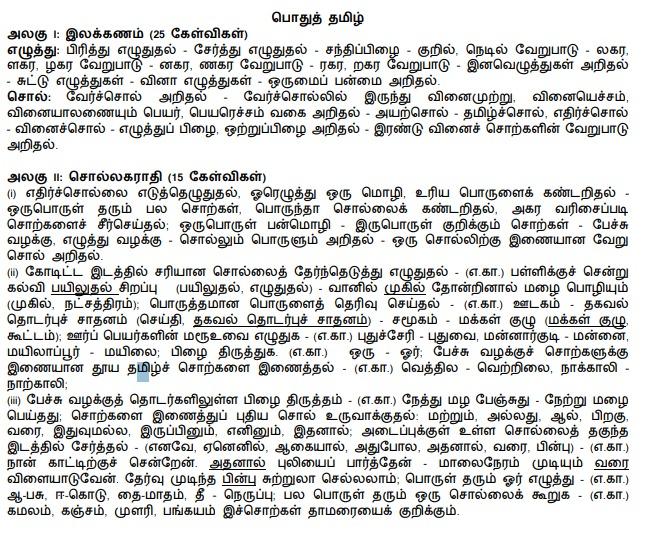
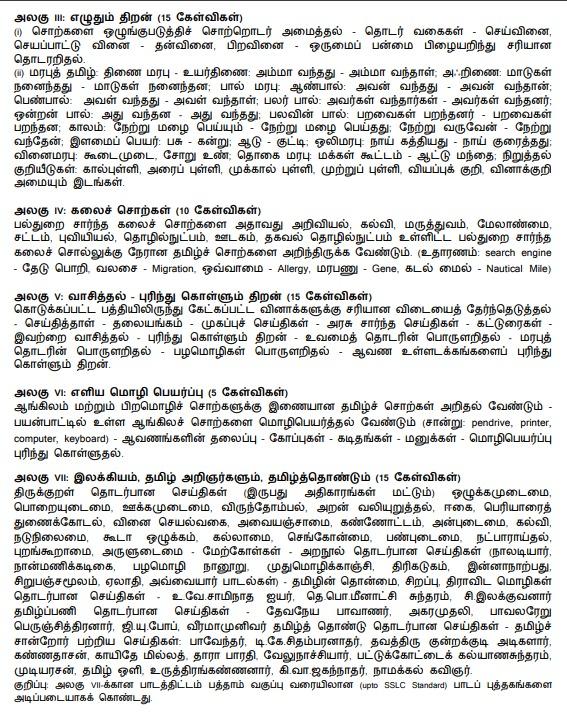
TNSPC Group 2 Exam Pattern 2025 For Preliminary Examination
The TNPSC Group 2 Exam Pattern 2025 has been provided to evaluate candidates on language proficiency, general awareness, and analytical skills. It comprises three sections: General Tamil or General English (SSLC Standard) with 100 questions, General Studies (Degree Standard) with 75 questions, and Aptitude and Mental Ability Test (SSLC Standard) with 25 questions.
In total, the paper has 200 questions carrying 300 marks, to be completed within 3 hours. This exam pattern ensures a comprehensive assessment of the candidate’s linguistic ability, subject knowledge, and problem-solving aptitude.
| TNPSC Group 2 Prelims Exam Pattern 2025 | |||
|---|---|---|---|
| Subjects | Number of Questions | Maximum Marks | Duration |
| General Tamil (S.S.L.C. Standard) or General English (S.S.L.C. Standard) | 100 | 300 | 3 hours |
| General Studies (Degree Standard) | 75 | ||
| Aptitude and Mental Ability Test (S.S.L.C. Standard) | 25 | ||
| Total | 200 | ||
TNPSC Group 2 Syllabus For Mains Written Exam
The TNPSC Group 2 Mains Exam is a written test comprising two papers. Paper I includes translation between Tamil and English, along with questions on precis writing, comprehension, hints development, essay writing on ‘Thirukkural,’ and letter writing.
Paper II focuses on topics from General Studies (Degree Standard), assessing the candidate’s subject knowledge in depth. For the convenience of candidates, we have provided the Paper I and Paper II regarding subject-wise information in the table given below
TNPSC Group 2 Syllabus For Mains Paper 1
| Subjects | Topics |
|---|---|
| Tamil to English Translation | Phrases, Synonyms, Antonyms, Prefix & Suffix, Fill in the blanks, Prepositions, Tenses, Voice, Homophones, Error Detection, Comprehension, Odd one out, Word Formation, Identify the sentence, Compound words |
| English to Tamil Translation | The figure of speech, Appreciation questions from poetry, Important lines from poem, Biography of important persons, Shakespeare, Oscar Wilde, Dr. Karl Paulnack, Comprehension questions from motivational essays, British English–American English, Comprehension questions from description of places |
| Precis Writing | Phrases, Synonyms, Antonyms, Prefix & Suffix, Fill in the blanks, Prepositions, Tenses, Voice, Homophones, Error Detection, Comprehension, Odd one out, Word Formation, Identify the sentence, Compound words |
| Hints Development | Poem & poets, Author & their stories, Biography & autobiography, Characters, Quotes, Important lines of Indian authors, Nationality of story, Drama, Folk arts, About poets, Dramatist, Famous quotes, Various works of author, Period of the poets, Nature-centered literary works and global issues (environment & conservation), Themes observed in literary work |
| Essay Writing in Thirukkural | Essay writing on the following topics from Thirukkural: (a) Significance as secular literature, (b) Relevance to everyday life, (c) Impact of Thirukkural on humanity, (d) Thirukkural and universal values – equality, humanism, etc., (e) Relevance to socio-political and economic affairs, (f) Philosophical content in Thirukkural |
TNPSC Group 2 Syllabus For Mains Paper 2
| Unit | Topics |
| Modern History of India with specific reference to Tamil Nadu (40 marks) | Advent of Europeans: The Portuguese, the Dutch, the English, the Danish and the French; Expansion of British rule: Carnatic Wars; Early uprisings against British rule: Revolt of Poligars, South Indian Rebellion, Vellore Mutiny, Indian National Congress — Moderates, Extremists and British response — Leaders from Tamil Nadu — role of Pulithevan, Veerapandia Kattabomman, Maruthu Brothers, Dheeran Chinnamalai, Velluchami, Kuyili and others; Role of Tamil Nadu in freedom struggle — V.O. Chidambaranar, Bharathiyar, V.V. Subramaniam, Thanikachalam, Subramania Siva, T.S.S. Rajan, Rajaji, Sathyamurthy, Kamaraj, Rukmani Lakshmi Pathi, Ambujammal and others; Types of freedom struggle — Sacrifices — Magazines — Literature — Plays/Drama — Songs — Films etc.; Contribution of women in the freedom struggle and social work: Dr. Muthulakshmi Ammayar, Muthuramalinga Thevar, Cuddalore Azhagammal, Thillaiyadi Valliammai and others; Impact of British Rule: Christian Missionaries, Development of Education, Judiciary, Local Self Governance System, Police, Transport and Communication; Disappearance of Indigenous Industries — Spread of Western Culture; Origin and Growth of “Social — Justice” ideology, Socio-Religious Movements, Political Parties and Achievements. |
| Tamil Society – Culture and Heritage (30 marks) | Ancient Tamil Society — Archaeological excavation evidence — Arikamedu, Adichanallur, Keezhadi — Sangam Literature — Classical Tamil; Thirukkural — Guidance for way of life to human elevation — Guidelines given by Thirukkural in the field of administration, judiciary and day-to-day life; Philosophical thoughts laid down by Thirukkural for betterment and integration of the whole of humanity; Social changes in Tamil Nadu in 19th and 20th centuries, Vallalar’s Samarasa Suddha Sanmarga Sathya Sangam; Origin and development of Justice Party — Impact of Rationalism Movement, Self-Respect Movement, Role and contribution of Dravidian Movement, Tamil Iyakkam (Pure Tamil Movement); Tamil Society Reforms personalities — Thanthai Periyar, Arignar Anna, and other scholars; Arts — Cultural contributions of Tamilians — Ancient cultural linkage of Tamilians — Conventional thoughts of Tamilians; Cultural elements: Tamil Nadu State Government Symbols — Experts in Cultural Fields — Folk Music, Folk Drama, Folk and World Tamil Conferences. |
| Social Issues in India with specific reference to Tamil Nadu (50 marks) | Population Explosion: Fertility — Mortality — Migration — Morbidity — Census 2011 — Population control measures — National Population Policy 2000 — Family planning and its achievements; Health: Care for senior citizens — Health problems — Poor nutrition; Health indicators; Issues related to public health: Rural and Urban Development Agencies — Health policy in India — Health care services — Panachayat Raj and Urban Development Agencies — School dropouts — Child Labour — Child Care — Issues of children and women; Media and its role — Communal violence — Law and order situation — Violence against women — Alcoholism — Drug addiction — Environmental issues: Climate change — Floods — Earthquakes — Tsunami — Drought — Pesticides and their impact — Pollution control; Socio-economic issues — Unemployment — Welfare schemes — Poverty eradication programmes — Rural Development — Women Empowerment — Religious violence — Terrorism and Communal Violence — Causes and remedies; Current Affairs. |
| Science and Technology in Development (40 marks) | Robotics and Applications; Atomic and Nuclear Physics — Applications of nuclear energy; Diodes and Transistors and their Applications; Broadcasting Technology; Electrochemical cells — Types of electrodes — Batteries — Lithium-ion Battery; Fuel cells; Gaseous fuels — LPG, Natural gas and water gas; Polymers: Thermoplastics and Thermosetting plastics, PVC, PET, Nylon 66, Teflon; Medicinal chemistry — Applications — Paracetamol and aspirin; Nanoscience — Fundamentals — Applications — Nano Biotechnology; Applications of Biotechnology — Plant Genetic Engineering — concepts — transgenic plants; Tissue culture; Stem cell technology; BT Cotton, Golden Rice, Flavr Savr tomato, Salt tolerant rice; Applications of genetically modified crops; Biotechnology in food crop improvement — Application of plant tissue culture in Forestry, Horticulture; Recombinant DNA Technology — DNA Cloning — DNA fingerprinting — applications of PCR and ELISA in disease diagnosis — hybridoma techniques in the production of Mono Clonal Antibodies (MCA) — Animal cell culture techniques — stem cells and its applications; Applications of GIS; Nanotechnology — Fundamentals — Applications; Nano Fertilizer, Nano Pesticides, Green Nanotechnology and Nano-farming; Advanced reproductive techniques: In-Vitro Fertilisation (IVF) — Intra-Uterine Insemination (IUI) — Intra Cytoplasmic Sperm Injection (ICSI) — Gamete Intra-Fallopian Transfer (GIFT) — cryopreservation; Computer — Computer Organisation and Architecture — System Software and Application Software — Data Communication Networks — Cryptography — Computer Graphics and Multimedia — Mobile Computing and Communication — Web Technology and applications — E-Commerce — Cloud Computing Architecture — IOT — Artificial Intelligence Applications — Machine learning — Cyber Security — Digital Technology — Biotechnology, Current Affairs. |
| Constitution, Polity and Governance in India with specific reference to Tamil Nadu (60 marks) | Constitution of India: Preamble and Philosophical features — salient features and Sources — Union and its Union Territories; Citizenship — Fundamental Rights, Fundamental Duties, Directive Principles of State Policy; Union Executive: President, Vice-President, Prime Minister and Council of Ministers — Cabinet — Parliament (Lok Sabha and Rajya Sabha) — Parliament Committees — Major Constitutional Amendments; State Government: Chief Minister and Council of Ministers — Tamil Nadu Legislative Assembly, Structure, Powers and Functions; Local Government: Three-tier system — 73rd and 74th Constitutional Amendments — Tamil Nadu Panchayat Act 1994 — Gram Sabha — Work of PRIs in Tamil Nadu — District Collector’s role in Development Administration; Dynamics of Indian Federalism — Centre-State relations; State Finance Commission; Union Finance Commission; Judiciary in India: Supreme Court, High Courts, District Courts — Subordinate Courts (Structure and Functions) — Judicial Review — Judicial Activism; Public Interest Litigation; Electoral System in India — Election Commission — State Election Commission; Political Parties and Political System in India — Regional and National Political Parties in India and Tamil Nadu; Integrity in Indian Polity: Corruption in public life — Anti-corruption measures — Lokpal and Lokayukta — Central Vigilance Commission — Comptroller and Auditor General of India — Central Bureau of Investigation — Enforcement Directorate; Right to Information Act; Right to Services — Consumer Protection Act 2019 — Human Rights — Human Rights Commission — Women’s Rights — Commissions for Vulnerable Sections; Social Audit — Citizen’s Charter; Political Rights in Tamil Nadu; Regional and National Commissions — Minorities Commission; Backward Classes Commission; SC/ST Commission; Reservation Policy in India and Tamil Nadu; Impact of welfare schemes and measures in the socio-economic development of Tamil Nadu; Role of Non-Governmental Organisations in Social Welfare; Government policies and interventions for development in various sectors and issues arising out of their design and implementation; Development processes and the development industry — the role of NGOs, SHGs, various groups and associations, donors, charities, institutional and other stakeholders; Welfare schemes for vulnerable sections of the population in Tamil Nadu — Education, Health, Industrial Development, Rural Development, Women and Marginalised Groups; e-Governance and Mobile-governance initiatives in Tamil Nadu; Public Service delivery in Tamil Nadu; Current Affairs. |
TNPSC Group 2 Mains Exam Pattern 2025 (Revised)
Candidates who successfully clear the prelims exam proceed to the TNPSC Group 2 Mains Exam, which comprises two parts: Paper I and Paper II. Only the answer sheets of candidates who attain the minimum qualifying marks in Paper I will be assessed for Paper II.
| TNPSC Group 2 Mains Exam Pattern: Paper 1 | |||||
| Number of Papers | Paper Name | Level | Type of Exam | Nature | Total Marks |
| I | Tamil Eligibility Test | SSLC | Descriptive | Qualifying | 100 |
| II | General Studies | Degree | Descriptive | Scoring | 300 |
Group 2 Mains Exam Pattern for Paper 2
The topic-wise marks distribution has been shared in the table below. Candidates can check the mark’s weight and prepare accordingly.
| TNPSC Group 2 Mains Paper 2 Exam Pattern | ||
| Sl. No. | Subject | Marks |
| 1 | Unit I: Modern History of India with specific reference to Tamil Nadu | 40 |
| 2 | Unit II: Tamil Society – Culture and Heritage | 30 |
| 3 | Unit III: Social Issues in India with specific reference to Tamil Nadu | 50 |
| 4 | Unit IV: Science and Technology in Development | 40 |
| 5 | Unit V: Constitution, Polity, and Governance in India with specific reference to Tamil Nadu | 60 |
| 6 | Unit VI: Geography of India, Environment, Biodiversity and Disaster Management in India with specific reference to Tamil Nadu | 40 |
| 7 | Unit VII: Indian Economy with specific reference to Tamil Nadu | 40 |
| Total | 300 | |
Group 2A Exam Pattern 2025 (Revised)
The TNPSC Group 2A Exam Pattern consists of 2 papers, which are both objective and descriptive tests. Check the details below.
| TNPSC Group 2A Mains Exam Pattern | ||||||
| Number of Papers | Paper Name | Level | Type of Exam | Nature | Question | Total Marks |
| I | Tamil Eligibility Test | SSLC | Descriptive | Qualifying | — | 100 |
| II | A. General Studies | Degree | Objective | Scoring | 100 | 150 |
| B. General Intelligence and Reasoning | SSLC | Objective | Scoring | 40 | 60 | |
| C. Language (General Tamil or General English) | SSLC | Objective | Scoring | 60 | 90 | |
| Total | 200 | 300 | ||||
TNPSC Group 2A Mains Syllabus 2025
The TNPSC Group 2 Exam Pattern 2025 for the Mains stage comprises General Studies, General Intelligence and Reasoning, and the Tamil Eligibility Test. The official syllabus PDF for TNPSC Group 2A Mains 2025 is provided below, enabling candidates to review the complete syllabus for more effective preparation
TNPSC Group 2 Syllabus 2025 Download PDF
The TNPSC Group 2 Syllabus for Prelims and Mains, released by the Tamil Nadu Public Service Commission, is provided in the article. For convenience, a direct link to download the official TNPSC Group 2 Syllabus PDF is also available in the table below.
| TNPSC Group 2 Syllabus 2025 For Prelims And Mains Exam | ||
| Preliminary Exam | ||
| TNPSC Group 2 & 2A | Language(General Tamil) | Download PDF |
| Language(General English) | ||
| Aptitude and Mental Ability | ||
| General Studies | ||
| Mains Exam | ||
| TNPSC Group 2 Syllabus | Tamil Eligibility Test | Download PDF |
| General Studies | Download PDF | |
| Question Pattern Paper II- General Studies – Descriptive Type | Download PDF | |
| TNPSC Group 2A | Tamil Eligibility Test | Download PDF |
| General Studies | Download PDF | |
| General Intelligence and Reasoning | ||
| Language(General Tamil or General English) | ||
TNPSC Group 2 Selection Process 2025
The Tamil Nadu Group 2 Selection process includes 3 stages. In each stage desired number of candidates will be shortlisted based on their merit. Candidates can check the following stages as part of the selection process, given below:
- Prelims
- Mains
- Interview (For Group 2 Services)
Useful Preparation Tips For TNPSC Group 2 Exam 2025
Here are some of the preparation tips for the candidates. You can use these methods for both the Prelims and Mains Exam. This will help you a great deal in managing your preparation and time:
- First and foremost, go through the TNPSC Group 2 Previous Year Papers and Syllabus. Both of these resources are complete guides to preparing for the Exam.
- Segregate all the topics mentioned in the TNPSC Group 2 Syllabus that need more attention. Give more time to the topics that you think are tough.
- After that, solve the Previous Year’s Papers and recognise your weaknesses and strengths.
- Also, give mock tests as many as you can and solve them, and learn from them with due diligence.
- Stay updated with the current affairs and the official announcements of TNPSC regarding the exam.
| Important Links:- | |
| TNPSC Group 2 Cut Off | TNPSC Group 2 Salary |


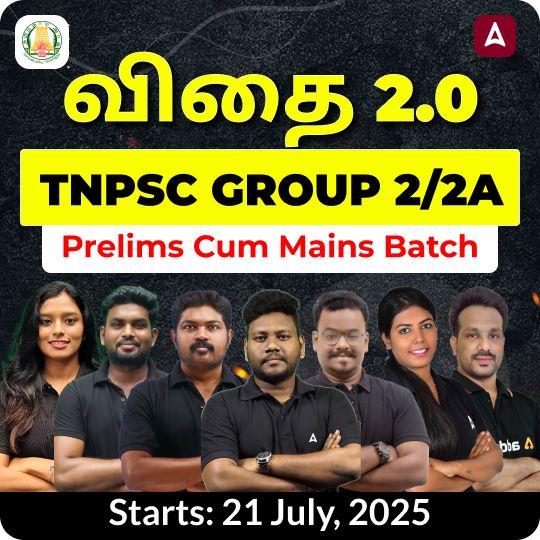


 Bihar Jeevika Livelihood Specialist Syll...
Bihar Jeevika Livelihood Specialist Syll...
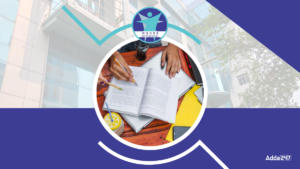 WBHRB Staff Nurse Syllabus 2025, Check D...
WBHRB Staff Nurse Syllabus 2025, Check D...
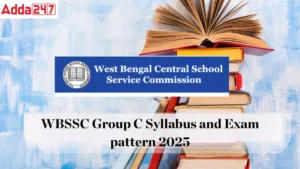 WBSSC Group C Syllabus and Exam Pattern ...
WBSSC Group C Syllabus and Exam Pattern ...
 Adda247 Job portal has complete information about all Sarkari Jobs and Naukri Alerts, its latest recruitment notifications, from all state and national level jobs and their updates.
Adda247 Job portal has complete information about all Sarkari Jobs and Naukri Alerts, its latest recruitment notifications, from all state and national level jobs and their updates.